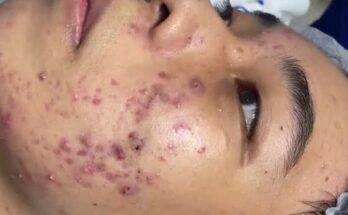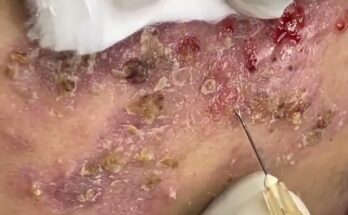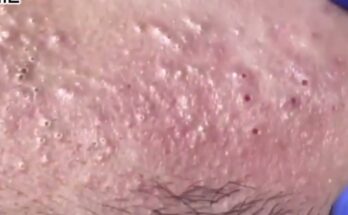FULL VIDEO 👇👇
Skin issues such as infected pimples and nose blackheads are common concerns that affect people of all ages. These conditions, while not life-threatening, can cause discomfort, self-consciousness, and even lead to complications if not managed correctly. Understanding the causes, appropriate medications, and preventive measures can help you maintain healthy, clear skin.
What Are Infected Pimples?
Infected pimples occur when clogged pores, filled with oil, dead skin cells, and bacteria, become inflamed. This leads to redness, swelling, pain, and pus formation. Common causes include hormonal changes, poor hygiene, and improper handling of acne.
If left untreated, infected pimples can worsen, leading to deeper infections, scarring, or more severe acne conditions. Recognizing the symptoms early and applying the right treatment is essential.
Medications for Infected Pimples
Effective treatment for infected pimples typically involves a combination of over-the-counter (OTC) remedies, prescription medications, and lifestyle changes. Here are the most commonly used options:
- Topical Antibiotics
- Medications like clindamycin and erythromycin help reduce bacterial growth and inflammation.
- Apply these directly to the affected area as prescribed by a dermatologist.
- Benzoyl Peroxide
- This powerful antimicrobial agent is available in various strengths as gels, creams, and washes.
- It works by killing acne-causing bacteria and unclogging pores.
- Salicylic Acid
- Salicylic acid is a beta-hydroxy acid that exfoliates the skin, removes dead cells, and reduces inflammation.
- It’s particularly effective for mild to moderate acne.
- Oral Antibiotics
- For severe infections, oral antibiotics such as doxycycline or minocycline may be prescribed.
- These reduce systemic inflammation and target deep infections.
- Retinoids
- Topical retinoids like tretinoin or adapalene promote skin cell turnover and prevent pore clogging.
- They are especially useful for recurring or persistent acne.
- Steroid Injections
- For painful, cystic pimples, a dermatologist may recommend a corticosteroid injection to reduce inflammation and speed up healing.
- Home Remedies
- Applying warm compresses can help drain pus and soothe inflammation.
- Natural ingredients like tea tree oil (a natural antibacterial) can also be used but should be diluted to prevent irritation.
What Are Nose Blackheads?
Nose blackheads are a type of non-inflammatory acne, also known as open comedones. They occur when hair follicles on the nose become clogged with oil and dead skin cells. The exposed surface of the clog oxidizes, turning it black.
Unlike infected pimples, blackheads are not painful but can be unsightly and challenging to remove if not addressed appropriately.
Treatment for Nose Blackheads
- Exfoliating Cleansers
- Cleansers containing salicylic acid or glycolic acid help break down the buildup of oil and dead skin cells.
- Use them twice daily to keep pores clean.
- Pore Strips
- These adhesive strips remove blackheads by pulling them out of the pores.
- While effective for temporary results, overuse can irritate the skin.
- Clay Masks
- Clay masks absorb excess oil and help draw out impurities from the pores.
- Use once or twice a week for best results.
- Retinoids
- Retinoids are not only effective for pimples but also work well on blackheads by improving skin cell turnover and preventing clogging.
- Professional Extraction
- Dermatologists or estheticians can manually extract blackheads using specialized tools.
- This ensures safe removal without causing scarring.
- Chemical Peels
- Light chemical peels containing alpha or beta hydroxy acids can deeply exfoliate and unclog pores.
- These treatments are often recommended for chronic blackhead issues.
Prevention Tips for Infected Pimples and Blackheads
Taking proactive steps to prevent skin issues is always better than treating them after they occur. Here’s how:
- Maintain a Skincare Routine
- Cleanse your face twice daily using a gentle, non-comedogenic cleanser.
- Moisturize with a lightweight, oil-free product.
- Avoid Picking or Popping
- Picking at pimples or blackheads can worsen inflammation, spread bacteria, and cause scarring.
- Use Sunscreen
- Protect your skin from harmful UV rays with a non-comedogenic sunscreen.
- Keep Hands Off Your Face
- Touching your face transfers oils and bacteria, increasing the risk of breakouts.
- Exfoliate Regularly
- Weekly exfoliation helps remove dead skin cells and prevent clogged pores.
- Eat a Healthy Diet
- Limit sugary and oily foods, as these can trigger acne in some individuals.
- Stay Hydrated
- Drinking plenty of water supports overall skin health and reduces oil production.
Conclusion
Infected pimples and nose blackheads are common but manageable skin conditions. By understanding their causes and using the right medications and preventive measures, you can achieve clearer, healthier skin. Whether it’s through topical treatments, professional care, or simple lifestyle changes, there’s a solution that fits every need. Always consult a dermatologist for persistent or severe cases to ensure proper treatment.


